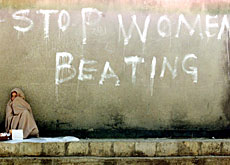Parliamentarian warns of “feminicide” in Mexico

A Swiss parliamentarian has appealed to the Mexican authorities to step up efforts to solve the disappearance of hundreds of women in the north of the country.
Ruth-Gaby Vermot-Mangold, who has just returned from the region, said Mexico also needed to improve conditions for women.
According to the human rights organisation, Amnesty International, more than 300 women and young girls have been murdered over the past decade in and around the cities of Ciudad Juárez, Tijuana and Chihuahua.
During her trip, the special rapporteur for the Council of Europe met political and judicial authorities, as well as human rights organisations and victims’ families.
Her findings will be presented to the Council of Europe later this year.
“[Mexican] parliamentarians speak about ‘feminicide’, which means that women are killed just because they are women,” Vermot-Mangold told swissinfo.
The Swiss parliamentarian said some of the deaths bore the hallmarks of serial killings, whereas others appeared to be the victims of a society where women were abused with impunity.
Botched investigations
Only a few of the murders have been solved so far. Amnesty International says this is because police investigations have been badly handled.
Vermot-Mangold confirmed this, saying it was difficult to get local authorities, prosecutors, judges and the police to cooperate and carry out investigations properly.
“Evidence is destroyed or the police cannot find proof… Parents of victims have a lot of problems with the judiciary, the police, etc,” she said.
She added that suspects were often tortured into confessing to a murder they had never committed.
This has led to the parents of victims losing confidence in the police, the investigating authorities and the criminal justice system.
According to Vermot-Mangold, the authorities are not willing to address their shortcomings, and the criminal justice system is “against good investigations in these cases”.
Although violence against women is illegal in Mexico, the Swiss parliamentarian found that it was socially acceptable in the country’s male-dominated culture.
She noted that the economic conditions for women in the region, many of whom had poorly paid jobs in “maquiladoras”, or assembly plants, did little to improve their situation.
“Women are not valued very highly, which means you can abuse them, beat them and this is not considered to be a crime by society, although legally it is a crime,” she said.
Change in sight?
Vermot-Mangold said she was confident that the human rights situation for women in the three Mexican cities would improve, but only over time.
“The attitude towards women is slowly changing, but it is a long and slow process,” she said.
She expressed hope that Maria Lopez Urbina, the new special federal prosecutor, and Ms Guadeloupe Morfin, the new special commissioner, would be given the powers and the resources to tackle the problems.
Vermot-Mangold added that new prevention projects were needed to prevent fresh crimes from occurring in Ciudad Juárez and Chihuahua.
“The Council of Europe can provide expertise to support Mexico, if Mexico changes its laws, justice system, and if Mexico is willing to introduce prevention programmes in schools, organisations, the police force and other authorities,” she said.
swissinfo, Katalin Fekete
Since 1993 more than 300 women were killed.
The murders took place in three Mexican cities across the border from the US.
On February 18, 2004, the Parliamentary Assembly of the Council of Europe urged Mexico to improve the situation of women.
The Parliamentary Assembly of the Council of Europe has urged Mexico, which has observer status, to solve the killings and improve the human rights situation of women.
Vermot-Mangold went to Mexico at the invitation of the observer delegation to meet political and judicial authorities, as well as human rights organisations and victims’ families.
Her findings on the disappearance and murder of women in Mexico will be published in a report to the Committee on Equal Opportunities for Women and Men.

In compliance with the JTI standards
More: SWI swissinfo.ch certified by the Journalism Trust Initiative


You can find an overview of ongoing debates with our journalists here. Please join us!
If you want to start a conversation about a topic raised in this article or want to report factual errors, email us at english@swissinfo.ch.